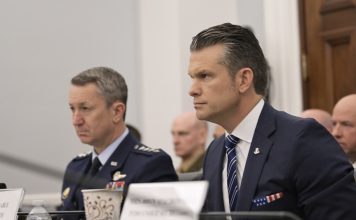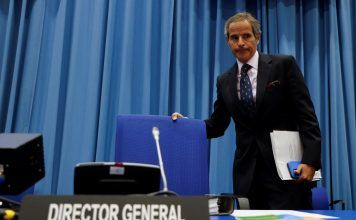By Kayhan Life Staff
Islamic Republic officials hope that the U.S. will rejoin the 2015 Joint Comprehensive Plan of Action (JCPOA), better known as the Iran nuclear deal, when President-Elect Joe Biden assumes office in January 2021.
President Donald Trump withdrew from the agreement in May 2018 unilaterally and reimposed economic sanctions lifted under the nuclear deal.
French President Emmanuel Macron and German Chancellor Angela Merkel were among the first world leaders to congratulate Mr. Biden and Vice-President-Elect Kamala Harris on their win. President Macron and Chancellor Merkel have been staunch critics of President Trump for pulling out of the JCPOA.
They have reportedly told the Biden-Harris team that they hope the U.S. will rejoin the nuclear agreement. Germany and France were members of the P5+1, which signed the JCPOA in 2015. Others were China, Russia, Britain, the U.S., and the EU.
Earlier in November, the United Nations nuclear watchdog, the International Atomic Energy Agency (IAEA), released a report that said Iran’s stockpile of low-enriched uranium had reached 2,442.9kg (5,385.6lb), nearly 12 times the amount permitted under the JCPOA.
In another development, several Western media outlets recently reported that the U.S. and Israel had worked together to track and kill a senior al-Qaida operative, Abu Mohammed al-Marsi, in Iran earlier this year.
“Four current and former U.S. officials said Abu Mohammed al-Marsi, al-Qaida’s No. 2, was killed by assassins in the Iranian capital in August,” AP reported on Nov. 15. “The U.S. provided intelligence to the Israelis on where they could find al-Masri and the alias he was using, while Israeli agents carried out the killing, according to two of the officials. The two other officials confirmed al-Masri’s killing but could not provide specific details.”
Following the alleged assassination of al-Masri, Michael Oren, former Israeli Ambassador to the U.S. (2009-13), tweeted: “The media reports that Israeli agents killed al-Qaeda’s No. 2 leaders in Tehran. No one is asking why Iran is hosting al-Qaeda commanders and why the U.S. should renew a nuclear deal that gives tens of billions of dollars to those who harbor the murderers of 3,000 Americans.”
Israeli Operatives Killed Al Qaeda’s No. 2 Leader in Iran in August -New York Times
In an interview with CNN on Sept. 13, Mr. Biden said: “I will make an unshakeable commitment to preventing Iran from acquiring a nuclear weapon. I will offer Tehran a credible path back to diplomacy. If Iran returns to strict compliance with the nuclear deal, the United States will rejoin the agreement as a starting point for follow-on negotiations. With our allies, we will work to strengthen and extend the nuclear deal’s provisions, while also addressing other issues of concern.”
“We will continue to push back against Iran’s destabilizing activities, which threaten our friends and partners in the region,” Biden added. “Drawing on the record-setting U.S.-Israel security help agreement signed, I was Vice President; America will also work closely with Israel to ensure it can defend itself against Iran and its proxies. We will continue to use targeted sanctions against Iran’s human rights abuses, its support for terrorism and ballistic missile program.”
At a media roundtable with Israeli journalists in Jerusalem on Nov. 9, U.S. Special Representative for Iran And Venezuela Elliott Abrams said: “It doesn’t matter who is president on Jan. 20 in the sense that there’s going to be a negotiation with Iran. That was the intention of the Trump administration, so that’s not a source of disagreement. Whether it is possible to go back to the JCPOA remains to be seen.”
“JCPOA is five years old. The first sunset has already taken place in the eyes of many countries in the world, the arms embargo, which we have been trying to avoid through the snapback of sanctions. There are more sunsets, as you know, built-in at the eight-year level, at the 10-year level, at the 15-year level,” Mr. Abrams added. “So, five years have already gone by, and Iran is not in compliance with the JCPOA and, in the last two years especially, a significant sanctions program has been implemented that includes not only nuclear sanctions but human rights sanctions and counterterrorism sanctions.”
Meanwhile, Maria Zakharova, spokesperson for the Russian Foreign Ministry, recently said: “The U.S. should not set new conditions for rejoining the JCPOA, especially regarding the non-nuclear issue. It must also lift all sanctions.”
Some political observers argue that while the Biden administration will maintain a tough stance against Iran’s regional ambitions, ballistic missile program, and nuclear activities, it will adopt a less hostile policy towards Tehran.
“The Biden administration ‘at a minimum’ could remove obstacles placed by the Trump administration to European efforts to maintain economic benefits granted under the deal,” Ellie Geranmayeh, an Iran specialist at the European Council on Foreign Relations think-tank, was quoted by the Financial Times on Nov. 10 as saying. “These include existing or proposed mechanisms to offer credit lines to Tehran backed by Iran’s crude production and trade finance for deals between European and Iranian companies.”
In an interview with the Financial Times, Suzanne Maloney, a senior fellow at the Brookings Institution’s Center for Middle East Policy, said: “There would be an early diplomatic push to get both sides back into ‘greater compliance’ with their obligations, but not necessarily a full-fledged, full-footed, jump back into the JCPOA entirely. An interim nuclear deal might be on the cards.”
“People who are around Biden and will be part of his foreign policy team are personally invested in the success of the JCPOA, having had a hand in it,” Ms. Geranmayeh added. “If you accept that the strategic logic of the nuclear deal is still valid and that there are interesting for both sides to get it back on track, then all the problems are manageable.”
However, many senior Iranian officials, particularly conservatives and hard-liners, view Biden’s desire to rejoin the JCPOA with skepticism. While hoping that his administration will take a conciliatory approach to Tehran, they do not believe that the U.S. policy on Iran will change.
In comments reported by the Tehran-based Didban-Iran news agency on Nov. 12, Ahmad Khatami, a member of the Assembly of Experts, said: “We should not speak to Americans. We must hate them. It would be naïve and amateurish to warm up to them.”
In an interview with the Tehran-based Farda News on Nov.15, Hojatoleslam Gholamreza Mesbahi-Moqaddam, a former Majlis (Iranian Parliament) deputy and current member of the Expediency Council, said: “Trump made things tough for the Islamic Republic. However, that does not mean we should be conciliatory now. We should not be eager for talks and must wait for Biden to reach out to us.”
President Hassan Rouhani’s government believes that the Biden administration will replace the current U.S. policy of “maximum pressure” with “constructive talks.” Biden’s victory has prompted many reformist politicians to propose nominating Foreign Minister Mohammad Javad Zarif as their candidate in the Iranian presidential election to be held in June 2021.
Ultimately, it is Iran’s Supreme Leader Ayatollah Ali Khamenei and the Islamic Revolutionary Guards Corps (IRGC) that have the final say on whether to open talks with the U.S. Mr. Khamenei, and the IRGC have always maintained that Iran’s regional military activities, ballistic missile program and support for Shia militias are not open for discussion.
Those who oppose U.S. rejoining the JCPOA split into two groups:
- Some opposition groups in Iran and abroad argue that starting talks with the Islamic Republic would only strengthen the senior clerics and the IRGC and embolden them to oppress Iranian citizens.
- The establishment in Iran sees no difference between Trump and Biden. They believe that the U.S. poses an existential threat to Iran regardless of who is in the White House, albeit even the most ardent enemies of the U.S. are not against secret negotiations with Washington entirely.
Those who support the U.S. in rejoining the JCPOA split into three groups:
- Many people blame the sanctions for Iran’s economic crisis and therefore believe the conditions would improve if the U.S. were to rejoin the JCPOA.
- Some hope an easing of sanctions would revive trade opportunities with Iran and do not care about the Islamic Republic’s regional activities and human rights violations.
- Still, others believe Trump’s policy of “maximum pressure” has failed. They argue Biden will form an international coalition against Iran as the one Obama had created.
Germany, France, and Britain’s efforts in the past few years to promote “trilateral discussions” and “critical dialogue” to facilitate Iran’s reformists have yielded no tangible results.
Obama and his administration had hoped that the JCPOA would strengthen Iran’s reformists and appease the Islamic Republic regime. In January 2016, the Islamic Republic released five American hostages after the U.S. delivered $400 million in cash, which reportedly was part of Iranian assets seized in 1979. However, the IRGC used the money to fund its military activities in the region and support Shia militias under its control.
It is unclear which political faction will lead the talks with the U.S. — if it happens — given that Khamenei and his supporters believe that the JCPOA has been a dismal failure. Also, it is highly doubtful that Biden will rejoin the JCPOA without preconditions.
Yet by breathing new life into the nuclear deal, Biden might enable the Islamic Republic regime to tighten its grip on the country and boost its international standing.
This article was translated and adapted from Persian by Fardine Hamidi.








